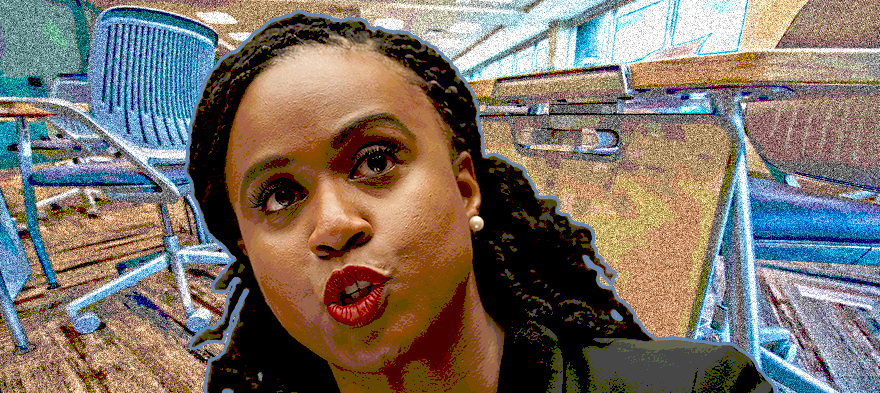
Jul 19, 2019 12:00:00 AM
Congresswoman Ayana Pressley said, “We don’t need any more Brown faces that don’t want to be a Brown voice” in regards to representation on issues that impact our communities.
I think this is something that many of us have felt but haven’t had the courage to say in a country where people of color feel like they need to stick together against the MAGA clan. But, I’m glad she said it because it’s true—we absolutely don’t need any more Black or Brown faces who aren’t representing our voices, especially in education.
Now before y’all revoke my Black card, hear me out.
On any day of the week, you’ll catch me in Issa Rae mode and rooting for everybody Black—especially Black kids.
But keeping it real, having the same skin color as our marginalized students doesn’t automatically make us qualified to meet or speak for their needs.
Like, as much as I love and applaud Black people who are courageous enough to open schools geared towards supporting Black students, we cannot have people like Michael and Tracey Landry at the helm.
In case y’all forgot, they founded T.M. Landry College Preparatory School in Breaux Bridge, Louisiana, that has been accused of and is now under FBI investigation for abusing underprivileged Black students and falsifying their college applications to get them accepted to Ivy League universities around the country.
Now it’s bad enough that they coached their students to use almost every negative stereotype associated with Black people—to evoke pity for the “poor Black kids” from these colleges.
But worse than that, they set some of their students up for failure when they were admitted to these schools, but were unprepared to succeed. One Landry graduate, Asja Jackson, ended up leaving Wesleyan University after just one month because she was struggling in her classes and depressed over the thought that she wasn’t smart enough.
Having these kids exaggerate their circumstances, ill-preparing them for college and giving them false hope is worse than sending them to a failing school. The Landrys have not only put a stain on Black leadership in education but they’ve damaged these kids’ confidence levels and sacrificed their dignity for the prospect of fame. They’re no better than the racist systems that tell our Black kids that they aren’t good enough.
While the NAACP has undoubtedly been instrumental in the advocacy and progression of Black issues since its founding in 1909, it’s the opposition to charter schools that is halting progression.
I can’t wrap my head around why an organization whose sole purpose is to help Black people would take a stance that could hurt Black people. Because I said it once and I’ll say it until I’m blue in the face—traditional public schools are failing our kids.
Some NAACP members obviously feel the same way, because a few chapters have chosen to break ranks with the national organization in support of school choice.
Thousands of Black parents have chosen to send their kids to charter schools and are vehemently opposed to returning them to traditional public schools.
Charter schools are more likely to pair Black students with Black teachers, which aligns with data that says students perform better in these types of environments. And finally, they’ve created spaces and cultures that encourage Black leadership and autonomy.
So, what’s the problem?
I’m not saying charter schools are the be-all and end-all, or that they’re all performing up to par. But some of the constituency that the NAACP represents are depending on those options and their decisions deserve acknowledgment and respect. Who’s national really speaking for?
Like LeeAndra Khan said in her tweet, “You must have the stomach for conflict if you want to change systems that don’t serve everyone.”
She’s right. And I’d add that you have to have the stomach to call people out, even if they look like you or may have been on your side at some point. We’re fighting an uphill battle for equality and everybody has to be held accountable for doing right by our kids.
Tanesha Peeples is driven by one question in her work—“If not me, then who?” As the former Deputy Director of Activist Development for brightbeam, Tanesha merges the worlds of communications and grassroots activism to push for change in the public education system. Her passion for community and relentless mission for justice and liberation drive her in uplifting and amplifying the voices and advocacy of those that are often ignored. Tanesha wholeheartedly believes that education is the foundation for success. Her grand vision is one where everyone—regardless of ethnicity, socioeconomic status, gender or ZIP code—can have access to a comfortable quality of life and enjoy the freedoms and liberties promised to all Americans. And that's what she works towards every day.
The story you tell yourself about your own math ability tends to become true. This isn’t some Oprah aphorism about attracting what you want from the universe. Well, I guess it kind of is, but...
If you have a child with disabilities, you’re not alone: According to the latest data, over 7 million American schoolchildren — 14% of all students ages 3-21 — are classified as eligible for special...
The fight for educational equity has never been just about schools. The real North Star for this work is providing opportunities for each child to thrive into adulthood. This means that our advocacy...
Your donations support the voices who challenge decision makers to provide the learning opportunities all children need to thrive.
Ed Post is the flagship website platform of brightbeam, a 501(c3) network of education activists and influencers demanding a better education and a brighter future for every child.
© 2020–2024 brightbeam. All rights reserved.
Leave a Comment